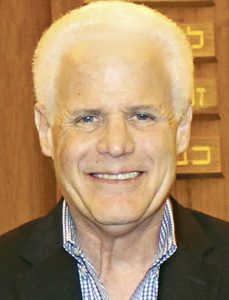Pinchas: Zealotry or integrity?

By Rabbi Cary Kozberg, Temple Sholom, Springfield
A zealot must be shalem (perfect, whole), without blemish, before acting. — Kiddushin 60a
It is the integrity of the leader that promotes integrity or prevents the “dis-integration” of the system he or she is leading. — Edwin Friedman, A Failure of Nerve: Leadership in the Age of the Quick Fix
The Torah portion Balak concludes with Aaron’s grandson Pinchas slaying the Israelite man Zimri, and the Midianite woman Cosbi, as they engage in illicit relations during an episode of religious apostasy by the people of Israel.
The weekly portion that follows begins with God commanding Moses to tell Pinchas that his zeal for God: 1. prevented God from destroying the people and 2. merited for Pinchas both the priesthood and God’s pact of friendship.
Curiously, our tradition is ambivalent about Pinchas’ action. Many commentators salute his zealotry, but caution that such an act was an exception, and thus normally prohibited.
And yet, Pinchas is identified with Elijah the prophet (Baba Metzia 114a), and is the inspiration for Mattathias’ bloody response to public apostasy, which triggered the Maccabean revolt.
However, believing that zealotry — often labeled “religious fanaticism” — is never a legitimate response to challenges to religious or social order, most contemporary Jews likely take great exception to Pinchas’ response.
One modern commentator, Rabbi Y. Eiger, notes that this Torah portion is always read alone (not connected to another) precisely because Pinchas was a zealot, and zealots must always be isolated.
Another, Rabbi Arthur Green, compares him to King David (guilty of conspiring to murder Uriah, Bathsheba’s husband) and calls him a “murderer.”
The fact is: God punishes David, but praises Pinchas. Moreover, God promises Pinchas not “a covenant of peace,” but “My covenant of peace” (briti shalom), perhaps to say: “Future generations may have their own ideas about your act. Nevertheless, My support for you is forever.”

Moreover, Rabbi Hirsch Leib Berlin’s commentary Ha-Emek Davar suggests that God’s telling Moses to personally communicate God’s response to Pinchas is an appropriate punishment for Moses. He compares Moses to a general who shirks his duty during battle, and then is “rescued” by a common soldier’s suggestion. When the king hears about it, he orders the general himself to pin a medal on the soldier.
Questioning the legitimacy of zealotry is certainly not new to our tradition. However, given the times we live in, we are probably more critical/cautious of Pinchas than our ancestors were.
Still, an authentic desire to better understand the text should have us consider other perspectives. One such perspective may be gleaned from the late rabbi/psychotherapist Edwin Friedman’s book, A Failure of Nerve: Leadership in the Age of the Quick Fix.
Friedman writes that various institutions in our society — from family units to government — often demonstrate a pervasive “highly reactive atmosphere,” characterized by “a regressive mood that contaminates decision-making processes.”
This description also seems to fit the emotional profile of the generation of the Exodus. Certainly, that generation was a reactive, anxious, and emotionally regressive group if there ever was one. Just consider the following symptoms, enumerated by Friedman as indications of such emotional regression:
- A palpable anxiety caused by the quick and substantive changes of the Exodus (think: “no time to make provisions…”), cranking up a vicious cycle of reactions to events and to each other.
- The people seeing themselves as victims, displacing blame to Moses, Aaron and God, rather than taking responsibility for their own newly-liberated destinies. This response led to:
- A herding together, leading to their adapting to the least emotionally mature members of the community (the Golden Calf, chronic complaining, the response to the spies’ report).
- A desire to seek a quick fix (“let’s go back to Egypt!”). Rather than focus on fundamental change, the people created an ideal atmosphere for demagoguery (Korach).
For Friedman, these phenomena create an atmosphere in which decisive leadership can and will be sabotaged by those being led — exactly what happened to Moses: although called God’s most faithful servant, Moses eventually lost his nerve.
Despite his decisive leadership, reactive episode after reactive episode after leaving Egypt apparently eroded his confidence and his integrity. Moses may have begun as a well-differentiated leader — clear about his goals, and able to modify his own reactivity to keep from drowning in the collective anxiety swirling about him.
Unfortunately, he came to personify the reactive anxiety which he as the leader was supposed to calm. This may explain why God fires him after he strikes the rock.
By contrast, Pinchas’ response — albeit inappropriate (!) by contemporary standards — can be seen as the epitome of clarity, integrity, decisiveness.
As Rabbi Menachem Esh notes in his commentary Homat Esh: Pinchas could have reasoned that if the recognized leaders did not respond to Zimri’s deed, then he too could stand aside. But being “zealous for his God,” he took personal responsibility to sanctify God’s name, even though those greater than he had decided to stand down.
With this in mind, the above-quoted teaching about a zealot’s needing to be shalem, might be understood not as “perfect” (no human being is), but rather “well-differentiated”, and impervious to emotional sabotage.
Certainly, this must apply to a leader. As persons of emotional maturity and integrity, both the kosher zealot and true leader understand necessary decisive action may at times seem unreasonable. Both accept full responsibility for — and others’ reactivity to — unpopular decisions and actions. Pinchas provided what Moses could no longer offer.
In a time when so much violence has been done in the name of sacred causes, Pinchas’ response seems not only unreasonable but dangerous. Yet, the Torah portrays him acting out of integrity, preventing the disintegration of the people. From our (reactive?) perspective, it isn’t clear at all that he acted correctly. However, it seems apparent that from God’s perspective, his act of integrity served to strengthen the emotional integrity of the people. He was rewarded accordingly.
The proof?
After Pinchas acted, the reactive eruptions from the people ceased.
To read the complete July 2017 Dayton Jewish Observer, click here.


